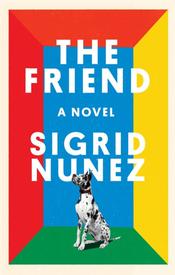_Marion_Ettlinger.jpg)
|
|
| photo: Marion Ettlinger | |
Sigrid Nunez is the author of seven books and many short stories and essays, and she teaches writing. She's received a Whiting Award, the Rome Prize in Literature and a Berlin Prize fellowship. In Sempre Susan, Nunez wrote a revealing memoir about Susan Sontag, an American writer, filmmaker, teacher and political activist who played a significant role in Nunez's personal and professional life. In her new novel, The Friend (see our review below), Nunez explores the bond between a grief-stricken woman and a dog she reluctantly agrees to foster after the death of her mentor and friend.
Suicide, writing and dogs form the basis of this novel.
Yes, in recent years I happened to learn that a number of people I knew had been obsessing about suicide. Not that they were actually planning to do it, but it seemed to be always on their minds. And in fact, very sadly, one of those people has since taken his own life. So that was one very important thread. Another thread was my work as a writing teacher and the idea of literary mentorship. And then I've always been interested in human-animal companionship. I saw a way to explore all these subjects in one novel.
Did you know from the start that a dog--Apollo--would be the cornerstone of The Friend?
I can't remember exactly at what point Apollo became such an important part of the story, but he's based on dogs I've known in real life.
What's been your experience with dogs?
I've always loved dogs. It was one of the great "unhappinesses" of my childhood that we lived in a place where no dogs were allowed. Later, around the time I went to college, my family had a Great Dane, and I had a dog whose sire was a Great Dane when I was in my 20s.
Is your history with Great Danes why you chose to create Apollo as a Harlequin Great Dane in the novel?
I was drawn to the idea of an exceptionally large and visually striking animal.
Many of your novels are written in a very intimate, first-person point of view. Do you find it easier, more accessible, to write in this voice?
It's not really a question of what's easier or more accessible but rather which point of view best suits a particular story. In The Friend, for example, from the beginning I knew I wanted an intimate, first-person voice. To be more precise, I wanted the narrative to sound like a letter, and not just any letter but a love letter. That was the tone I was going for: intimate, hushed, urgent.  An unnamed speaker narrates The Friend. And many other characters are also unnamed. Why?
An unnamed speaker narrates The Friend. And many other characters are also unnamed. Why?
To name or not to name a fictional character isn't a choice that I make beforehand. It's something intuitive that comes with the writing. In writing The Friend, any time I thought about inventing a name for a human character it struck a false note, and I was immediately compelled to get rid of it.
The Friend is rooted in the challenges of a writer's life. There's a quote in the book: "Some would say that, after all, the one sure way for an artist to know his work had failed was if everyone 'got' it." What's your feeling about this idea?
I would say that if everyone likes and approves of a certain work, it can't be very interesting. Oscar Wilde was right: "Diversity of opinion about a work of art shows that the work is new, complex, and vital. When critics disagree, the artist is in accord with himself."
How did writing The Friend differ from writing Sempre Susan?
In many ways, writing the memoir was easier than writing the novel for the simple reason that I didn't have to invent anything. I already had the story and the characters. But in other ways the process was much the same: a struggle to find the right words and the right order of words to make the narrative as effective as possible.
Your novels are unified by themes of death and grief and an inherent lack of understanding between people, yet a sincere need for protagonists to try to understand people and circumstances anyway. What draws you to these ideas and why?
These are some of the most important aspects of human experience, matters that touch us all. It seems to me only natural that this would be the material a novelist would want to grapple with and that people would want to read about.
If you could not be a writer and/or teacher of writing, what career path would you choose?
This is something I touch on in The Friend. My love for animals has always been very strong. I love all animals and am fascinated by animal behavior. I may very well have missed my true calling. I often wish I had pursued some career that had to do with the study, care or training of animals. I think I would have found much fulfillment in such work.
What can readers expect from you next?
I'm about 50 pages into a new novel, which has a narrative voice very similar to that of The Friend.
Will the new novel include another dog?
No. No animals this time--at least, not yet. --Kathleen Gerard, blogger at Reading Between the Lines.

